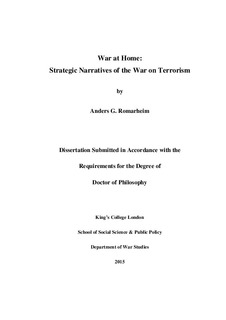| dc.description.abstract | This study reconstructs the main strategic narratives of the war on terrorism, as they appeared in American editorials. The study analyses 1002 selected editorials from five major news outlets in America. The analysis is structured around six salient events in the war on terrorism: the 9/11 attacks, the Iraq invasion, President Bush’s re-election, the Iraqi surge, Barack Obama replacing Bush, and Osama bin Laden’s death. The study also tests critical hypotheses from the literature on media, war and support. Are the media left to echo the rhetoric of the elites as wars break out? Or do media organizations develop independent news frames about wars as they progress? This study finds that the literature rightly favors the persuasive power of elite rhetoric early on in conflicts. Yet, important exceptions to this pattern are found. The study challenges the notion of elite rhetoric dominating news coverage through the case of The Wall Street Journal’s editorializing of war with Iraq. The Journal supported war with Iraq before the Bush administration. They called for toppling Saddam Hussein right after the 9/11 attacks. Therefore, the Bush administration adopted the Journal’s position, and not the other way around. Additionally, the study argues that Obama ended the war on terrorism, and the study considers the killing of Osama bin Laden to demarcate the end of America’s war on terrorism. The study also documents the emergence of a torture narrative that hijacked the war on terrorism, rendering it of limited use to Obama. The media were crucial in developing this narrative. This also challenges elite rhetoric domination. The study concludes that the home front is of increased importance due to new media realities. The dissertation shows that right after 9/11, the news outlets were overwhelmingly unison in their support for the war on terrorism. They openly called on Americans to sacrifice and support the war. With the Iraq war, unity and public support was fractured along ideological lines, resulting in a War at Home. | nb_NO |
